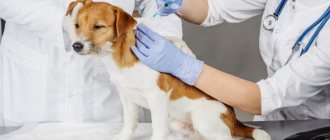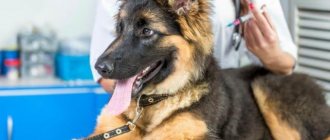A miniature, affectionate and cute Chihuahua is a pampered creature accustomed to comfort and warmth.
The immunity of dogs of this Mexican breed is quite fragile and susceptible to infections.
Will vaccination help? At what age should you get your first vaccinations? What diseases should Chihuahuas be protected from?
Read our article!
Are vaccinations necessary?
“Why does my dog need vaccinations? She almost never leaves the house, and if she does, it’s only in warm clothes!” - this phrase can often be heard from inexperienced breeders.
Despite all the care, and in some cases even overprotection, Chihuahuas cannot do without vaccinations, and here’s why:
- Most canine infections are transmitted by airborne droplets. Even if your pet doesn't leave the house, you can spread the infection on the bottom of your shoes by stepping in the feces of an infected dog;
- some diseases of a lonely person are dangerous for both humans and dogs - the pet can catch the infection from you;
- puppies and older dogs have extremely vulnerable immunity.
NOTE!
Vaccinations are especially important for representatives of the show class, since the presence of stamps in the veterinary passport also affects admission to participation.
At what age should the vaccination be given?
Chihuahuas are handed over to new owners at two months of age. At the same age, puppies receive their first necessary vaccinations.
Some breeders also vaccinate very small, one-month-old puppies. This measure is not mandatory, therefore vaccination earlier than two months is called “zero” vaccination.
In addition, many veterinarians encourage taking your time. The immunity of puppies is very fragile and is not always able to cope with the development of immunity against the vaccine. In veterinary practice, there have been cases where an entire litter of Chihuahua puppies died due to premature vaccination.
Expert opinion
Tolkachev Andrey Mikhailovich
veterinarian
Chihuahuas are often brought to me for appointments that do not have a single vaccination on their veterinary passport. This is a big omission on the part of the owner. A dog of this breed needs not only a balanced diet and vitamins, but also all the necessary vaccinations.
From what infections?
Chihuahua babies must be vaccinated against the following diseases:
- parainfluenza;
- viral enteritis;
- rabies;
- carnivore plague;
- infectious hepatitis;
- leptospirosis;
- adenovirus infection.
IMPORTANT!
Before purchasing a puppy, be sure to read its veterinary passport and consult with the breeder regarding the vaccination schedule.
Vaccination schedule
This table shows the vaccination schedule by age for Chihuahua puppies:
| Dog age | Name of vaccination |
| 2 months | DHPPI+Lepto or Nobivak Lepto |
| 3 months | Repeat the first vaccination |
| 4 months | Repeat the first and second vaccinations |
| 1 year | The drug Eurican LR. Rabies vaccination |
All vaccinations required for Chihuahuas are aimed at combating viral infections.
The drug, its quantity and schedule can be adjusted directly to the dog, depending on its state of health and immunity. However, most often veterinarians recommend sticking to the schedule presented above.
First
From parvovirus enteritis, leptospirosis, adenovirus infection and canine distemper. A week and a half before vaccination, puppies are given an anti-worm suspension.
Second
This action allows you to develop immunity in the puppy’s body and consolidate the achieved result. Again, 10 days before vaccination it is necessary to carry out deworming.
Third
It is carried out with the same drugs as the previous one, at 4–8 months, after the complete replacement of milk teeth with molars.
NOTE!
Chihuahuas need an annual booster vaccination at the same time.
Rabies vaccination
As a result of medical tests, it was proven that this vaccine is most difficult for Chihuahua puppies to tolerate. It is after this that various kinds of complications most often arise. For this reason, it is carried out after the first year of the dog’s life, when the body is sufficiently strong and all other vaccinations have already been completed.
The rabies vaccine maintains the dog’s immunity for three years, so revaccination more than once every 3 years does not make sense.
Due to the fact that Chihuahuas are quite small and fragile, it is not recommended to vaccinate yourself - there is a high risk of damaging muscles or blood vessels. It is better if the vaccination is done by a specialist from a veterinary clinic.
If you are planning to show your dog at an exhibition, make sure that the veterinarian is in charge in advance. The passport had all the necessary stamps. They will also come in handy when moving and flying.
Preparation for the procedure
The dog must be prepared for routine vaccination. Useful tips:
- Before visiting a doctor, assess your pet's health condition. Measure the temperature, check the condition of the mucous membrane;
- give a drug against helminths and treat for fleas 2 weeks before the procedure;
- Provide the Chihuahua with adequate nutrition, including on the day of vaccination.
Some veterinarians provide vaccination services at home. This is ideal for Chihuahua puppies to avoid emotional distress and stress for the dog. However, it is important to check the clinic that the doctor represents - it must be licensed.
What should you do after vaccination?
Stock up on diapers and litter for the litter box in advance, because after vaccinations your pet will not be allowed to go outside for two weeks. This measure is necessary in order to consolidate the effect of the vaccine and reduce the risk of a sharp decrease in immunity after experiencing stress.
Make sure your dog always has a clean diaper - this will save him from unnecessary stress, and you from having to clean up your pet’s puddles.
The dog will “come to its senses” for some time after a visit to the veterinary clinic. Make sure that other pets or children do not disturb the animal.
It is important that during this period the Chihuahua has a place where he can hide from noise and lie quietly. This could be a house or a bed, located away from drafts and heating appliances.
IMPORTANT!
Do not allow your dog to lick or scratch the injection site - this may cause an inflammatory process on the skin.
How the vaccine works
No vaccine provides 100% guarantee of effective protection against external pathogens, viruses and infections. However, vaccination is an important preventive measure aimed at a protective reaction and strengthening the immune system against viruses against which a medical drug has been developed. Some drugs protect against one disease, others against several (combination vaccine).
When creating a vaccine, virologists kill or chemically replace the original pathogen so that it is not capable of causing disease. This is a methodical process because... the virus or bacteria must still contain its original protein molecules (antigens) for the dog's immune system to produce antibodies. A vaccine containing a strong pathogen may cause the disease rather than prevent it. On the contrary, a pathogen that is too weak will not offer adequate protection.
Possible consequences
Often after the injection, the dog’s well-being changes:
- body temperature rises – the llama’s pads and nose become warm;
- a small subcutaneous lump appears at the injection site;
- the dog becomes lethargic and sleepy, refuses favorite games and toys;
- the pet loses its appetite and shows no interest even in treats;
- Puppies may have drooping ears.
This condition, as a rule, does not require correction. The dog's body develops immunity to the pathogen. Within 2-3 days the pet’s health should return to normal.
If there is no improvement and your four-legged friend’s condition only worsens, call a veterinarian immediately. Most often, this happens when the vaccine is given to an already sick animal. Since the vaccine begins to act only 10 days from the moment of administration, all this time the dog’s immunity is forced to fight with a double load.
If the dog becomes significantly worse after vaccination, Gixan serum will help it.
Post-vaccination quarantine
After vaccinating a Chihuahua, the owner should observe a number of restrictions aimed at maintaining the dog’s health and serious consequences. The duration of quarantine is 2 weeks.
The dog should not be allowed the following:
- stay outside (walk);
- contact with other animals;
- wash and bathe;
- scratch the injection site.
In addition to observing the precautions listed above, it is important for the owner to prevent hypothermia of the animal’s body and drafts, which is most important in the winter season.
Also, during the quarantine period, you should not overload the animal with active physical activity.
Do you keep your Chihuahua dog up to date on vaccinations? What vaccines do you use and why? Please share your opinion and experience in the comments below the article.
What to do if you missed a vaccination?
In the hustle and bustle of everyday life, it is very easy to forget about the need to vaccinate your pet on time. Sometimes owners remember this much later than expected and do not know what to do next.
Regardless of the situation, there is no need to panic. Consultation with a specialist is important here. After calculating how many days have passed since the last vaccination, he will make a decision.
NOTE!
If your pet is less than two weeks behind schedule, then one vaccination will be enough. If we are talking about more impressive periods, then the Chihuahua will have to go through the vaccine and revaccination with a break of a month, as it was in puppyhood.
approximate cost
Some owners who know how to administer vaccinations save on a visit to the veterinary clinic and administer the injections themselves, using a small syringe and drugs purchased in advance at a veterinary pharmacy.
This should only be done if you are absolutely confident in your own abilities and that it will not harm the dog in any way. In other cases, it is better to contact a qualified specialist.
The final price for the vaccination procedure is determined depending on:
- vaccine manufacturer companies;
- pricing policy of the veterinary clinic;
- region of the country;
- reputation of the veterinary clinic and its status (private or public).
On average, each vaccination for a Chihuahua costs from 150 to 300 rubles.
Briefly about the main thing
- Vaccinations help prevent infection with dangerous infectious diseases and reduce the risk of complications.
- Vaccination is carried out starting from 3 months, the optimal period is 8 weeks. At 12 weeks, an anti-rabies drug is administered. Revaccination is required annually.
- The Chihuahua needs to be prepared for the procedure. For this, it is recommended to have a nutritious diet, deworming and flea treatment.
Did you learn anything new in our article? Have you received the answers you were looking for or still have questions? Write your reviews in the comments.










